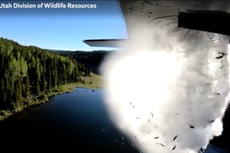Munching minuscule bacteria create the raw ingredients to power jets, scientists discover
While still far from being a reality, researchers say the molecules they made could help theoretically replace oil-based fuels
For the most part, airplanes, like the vast majority of transportation, are powered by fossil fuels.
To be more precise, planes are powered by jet fuel — a special fuel made from oil designed for the powerful engines that power the vessels through the skies.
But recently, one group of scientists have asked: What if you could power those planes with a fuel derived from bacteria?
In a recent paper, researchers have published new research that may lead in that direction. Using bacteria often found in dirt, the team created a molecule that could be used to create jet fuel, they said in a press release.
The results were published on Thursday in the journal Joule.
The “high-energy” molecule in question is naturally produced by these bacteria as they eat, the press release said, and is made up of carbon – much like fossil fuels such as oil.
These scientists figured out that these molecules stemmed from a group of enzymes — substances that can control chemical reactions inside of cells — known as “polyketide synthases”. And by using those enzymes, the team could produce these molecules en masse.
The team says that the substance they created in the end contains 50 megajoules of energy per litre. For reference, gasoline contains around 32 megajoules per litre.
But this process is far from being able to send commercial jets across the country. For one, scientists would need to figure out how to scale up production to get enough fuel to power a plane, or an industry of planes, for that matter.
Yet via the press release, the team behind this study believes it could be strong enough to power a rocket without using traditional fossil fuels.
“If we can make this fuel with biology there’s no excuses to make it with oil,” says Pablo Cruz-Morales, a microbiologist at the Technical University of Denmark and the lead author on this study.
Join our commenting forum
Join thought-provoking conversations, follow other Independent readers and see their replies
Comments


Bookmark popover
Removed from bookmarks